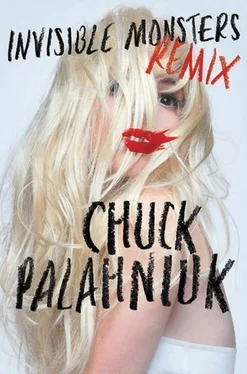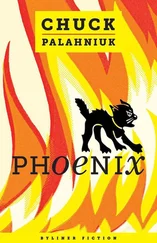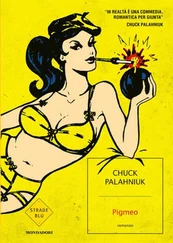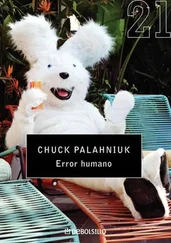At a train wreck you could pick up pencils two thousand at a time. Lightbulbs still perfect and not rattling inside. Key blanks by the hundreds. The pickup truck could only hold so much, and by then other trucks would be arrived with people shoveling grain into car backseats and people watching us with our piles of too much as we decided what we needed more, the ten thousand shoelaces or one thousand jars of celery salt. The five hundred fan belts all one size we didn’t need but could resell, or the double-A batteries. The case of shortening we couldn’t use up before it went rancid or the three hundred cans of hairspray.
“The police guy,” Brandy says, and every wire is rising out of her tight yellow silk, “he puts his hand on me, right up the leg of my shorts, and he says we don’t have to reopen the case. We don’t have to cause my family any more problems.” Brandy says, “This detective says the police want to arrest my father for suspicion. He can stop them, he says. He says, it’s all up to me.”
Brandy inhales and the dress shreds, she breathes and every breath makes her naked in more places.
“What did I know?” she says. “I was fifteen. I didn’t know anything.”
In a hundred torn holes, bare skin shows through.
At the train wreck, my father said security would be here any minute.
How I heard this was: We’d be rich. We’d be secure. But what he really meant was we’d have to hurry or we’d get caught and lose it all.
Of course I remember.
“The police guy,” Brandy says, “he was young, twenty-one or twenty-two. He wasn’t some dirty old man. It wasn’t horrible,” she says, “but it wasn’t love.”
With more of the dress torn, the skeleton springs apart in different places.
“Mostly,” Brandy says, “it made me confused for a long time.”
That’s my growing up, those kind of train wrecks. Our only dessert from the time I was six to the time I was nine was butterscotch pudding. It turns out I loathe butterscotch. Even the color. Especially the color. And the taste. And smell.
How I met Manus was when I was eighteen a great-looking guy came to the door of my parents’ house and asked, did we ever hear back from my brother after he ran away?
The guy was a little older, but not out of the ballpark. Twenty-five, tops. He gave me a card that said Manus Kelley. Independent Special Contract Vice Operative. The only thing else I noticed was he didn’t wear a wedding ring. He said, “You know, you look a lot like your brother.” He had a glorious smile and said, “What’s your name?”
“Before we go back to the car,” Brandy says, “I have to tell you something about your friend. Mr. White Westinghouse.”
Formerly Mr. Chase Manhattan, formerly Nash Rambler, formerly Denver Omelet, formerly Independent Special Contract Vice Operative Manus Kelley. I do the homework: Manus is thirty years old. Brandy’s twenty-four. When Brandy was sixteen, I was fifteen. When Brandy was sixteen, maybe Manus was already part of our lives.
I don’t want to hear this.
The most beautiful ancient perfect dress is gone. The silk and tulle have slipped, dropped, slumped to the fitting room floor, and the wire and boning is broken and sprung away, leaving just some red marks already fading on Brandy’s skin with Brandy left standing way too close to me in just her underwear.
“It’s funny,” Brandy says, “but this isn’t the first time I’ve destroyed somebody’s beautiful dress,” and a big Aubergine Dreams eye winks at me. Her breath and skin feel warm, she’s that close.
“The night I ran away from home,” Brandy says, “I burned almost every stitch of clothing my family had hanging on the clothesline.”
Brandy knows about me, or she doesn’t know. She’s confessing her heart, or she’s teasing me. If she knows, she could be lying to me about Manus. If she doesn’t know, then the man I love is a freaky creepy sexual predator.
Either Manus or Brandy is being a sleazy liar to me, me, the paragon of virtue and truth here. Manus or Brandy, I don’t know who to hate.
Me and Manus or me and Brandy. It wasn’t horrible, but it wasn’t love.
Now, Please, Jump to Chapter Seventeen
 aisy St. Patience only started Spitefield Park because her parents died. If it softens the blow, please know that they died in their sleep. Simply drifted away …sorry, Mom, sorry, Dad. The culprit was a faulty pilot light on their furnace. The first cold night of October, and the batteries in their smoke detector had long before preceded them in death. Nobody felt any pain except for Daisy, who knew exactly what words she wanted carved on their tombstone, but no cemetery would allow it. The inscription wasn’t even the worst message that sprang to mind. Go shopping for tombstones, and you, too, will be impressed by the limited selection.
aisy St. Patience only started Spitefield Park because her parents died. If it softens the blow, please know that they died in their sleep. Simply drifted away …sorry, Mom, sorry, Dad. The culprit was a faulty pilot light on their furnace. The first cold night of October, and the batteries in their smoke detector had long before preceded them in death. Nobody felt any pain except for Daisy, who knew exactly what words she wanted carved on their tombstone, but no cemetery would allow it. The inscription wasn’t even the worst message that sprang to mind. Go shopping for tombstones, and you, too, will be impressed by the limited selection.
Lady Daisy realized she wasn’t the only one of anything. Other like-minded bereaved must have had money to spend with mixed feelings. The land was cheap, and she was a gal with half a face for the sympathy vote. Daisy St. Patience, her least favorite movie was where Judy Garland does all of that full-color singing and dancing just to end up back in dreary black-and-white. Her dog is the only person who shows any gumption. Before the story even starts, he bites Margaret Hamilton off-screen. The dog rescues Jack Haley and draws the green curtain aside to expose the shenanigans of Frank Morgan. MGM spent a fortune. Yet after weeping buckets of glycerin and being clutched by winged monkeys Judy Garland is happy to wake up in a dirty bed surrounded by men. Nuh-uh. No way. To Daisy that didn’t read as enlightenment.
Daisy St. Patience fixed the pilot light. She sold her parents’ house and put the money toward a good surveyor to eyeball the plot lines. The long-term truth is that people’s hearts change across time. Not just the hearts of the wildly vindictive. Even the widower whose wife was laid to rest beneath a granite marker that said:
I couldn’t be bothered to shave my legs
A year later, even he phoned back to sheepishly inquire about the cost of a new stone.
Again, as Harriet Beecher Stowe asked, “Dude, why can’t you do both ?” Why can’t a novel do this? You’re not dead until you’re dead.
What never failed to boggle Daisy was how Judy Garland had only just arrived in this glorious colorful place and she immediately wanted to run back to some boring pig farm. The fact that everyone else loved that film …what did that say about people? It says that most people can tolerate being over the rainbow for only about thirty seconds. Regret, Daisy knew, was the only confirmation of a well-lived life. If you didn’t occasionally go too far, you weren’t going anywhere. It was the dog—smart dog! good boy!—who chased the Siamese cat and baited Judy Garland to leave that dumb hot-air balloon which was taking her home. Time and time again, that dog did everything in its power to give Judy a better life.
In the alternate version of that movie, the way Daisy remembered it, when Judy awoke in Kansas, all giddy to be home in that tiresome dust and dirt, in the Daisy St. Patience Preferred Text Director’s Cut, that little dog bit Judy Garland. It jumped into that windblown bed and sank its teeth right in her ingrate ass.
Now, Please, Jump to Chapter Nine
 o this is life in the Brandy Alexander Witness Reincarnation Project.
o this is life in the Brandy Alexander Witness Reincarnation Project.
In Santa Barbara, Manus who was Denver taught us how to get drugs. The three of us were squeezed into that Fiat Spider from Portland to Santa Barbara, and Brandy just wanted to die. All the time, holding both hands pressed on her lower back, Brandy kept saying, “Stop the car. I got to stretch. I am spaz-am-ing. We have to stop.”
Читать дальше

 aisy St. Patience only started Spitefield Park because her parents died. If it softens the blow, please know that they died in their sleep. Simply drifted away …sorry, Mom, sorry, Dad. The culprit was a faulty pilot light on their furnace. The first cold night of October, and the batteries in their smoke detector had long before preceded them in death. Nobody felt any pain except for Daisy, who knew exactly what words she wanted carved on their tombstone, but no cemetery would allow it. The inscription wasn’t even the worst message that sprang to mind. Go shopping for tombstones, and you, too, will be impressed by the limited selection.
aisy St. Patience only started Spitefield Park because her parents died. If it softens the blow, please know that they died in their sleep. Simply drifted away …sorry, Mom, sorry, Dad. The culprit was a faulty pilot light on their furnace. The first cold night of October, and the batteries in their smoke detector had long before preceded them in death. Nobody felt any pain except for Daisy, who knew exactly what words she wanted carved on their tombstone, but no cemetery would allow it. The inscription wasn’t even the worst message that sprang to mind. Go shopping for tombstones, and you, too, will be impressed by the limited selection. o this is life in the Brandy Alexander Witness Reincarnation Project.
o this is life in the Brandy Alexander Witness Reincarnation Project.



